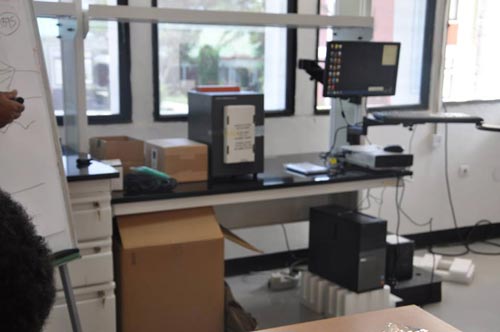By Adefris Teklewold/CIMMYT
The Nutritious Maize for Ethiopia (NuME) project recently donated key laboratory equipment to the Ethiopian Institute of Agricultural Research (EIAR) to help analyze new quality protein maize varieties. Institutional capacity building is a cross-cutting feature of NuME, which aims to disseminate quality protein maize (QPM) varieties in Ethiopia to improve nutrition.
In addition to promoting QPM varieties already released, NuME has set targets to develop more productive QPM germplasm that are resilient to biotic and abiotic stresses and adapted to the project area and beyond. Identifying QPM varieties easily adopted by farmers is a demanding task for breeders. The long-term QPM breeding program run by CIMMYT and EIAR fosters the cheap, fast and reliable screening technique of germplasm for quality protein traits. To help with these efforts, NuME donated a near-infrared spectroscopy (NIRS) sample transport reflectance only (TR-3752-C) 6500 system, accessories and supporting equipment, valued at US$ 103,000 to EIAR, CIMMYT’s major partner in executing the project. The machine can be used to determine the quality of different agricultural products, including ground and coarse samples, with a wavelength range of 400 to 2,500 nanometers.

Specifically, the machine will enable EIAR to undertake timely analysis of tryptophan, lysine and protein content for breeders, seed companies and the food and feed industry. The EIAR laboratory will serve as a national focal point to ensure that QPM seed and grain meets established definitions and standards for QPM. EIAR provides NIRS analysis on a cost recovery basis to ensure the sustainability of services for non-EIAR service users involved in QPM production, certification and trade. About 2,000 to 3,000 maize samples will be analyzed each year when the machine becomes fully operational. Experts installed the machine and led a hands-on training on 6-7 March given to 10 trainees drawn from public and private institutions and CGIAR centers. The training focused on installation and operation of NIRs and developing calibration equation.
Two researchers who are assigned by EIAR to work on the machine will be sent to Mexico for a two-week training on how to operate and develop calibration equations of tryptophan, lysine, protein and other QPM quality traits. During the presentation of the machine, Solomon Abate, EIAR director for quality control, said that CIMMYT has taken significant steps to enhance the capacity of the Ethiopian national agricultural research system to undertake QPM analysis within the country, which has largely been executed at CIMMYT headquarters in Mexico. In a letter to CIMMYT-Ethiopia, Fentahun Mengistu, director general of EIAR, wrote the NIRS machine is essential not only for use with QPM but for determining the quality of other crops and will enhance EIAR’s technology endeavors, which enable smallholder farmers to produce competitive products that can fetch better market prices. He underscored EIAR’s commitment to strengthening its partnership with CIMMYT for enhanced maize research and development in the country.
 Capacity development
Capacity development